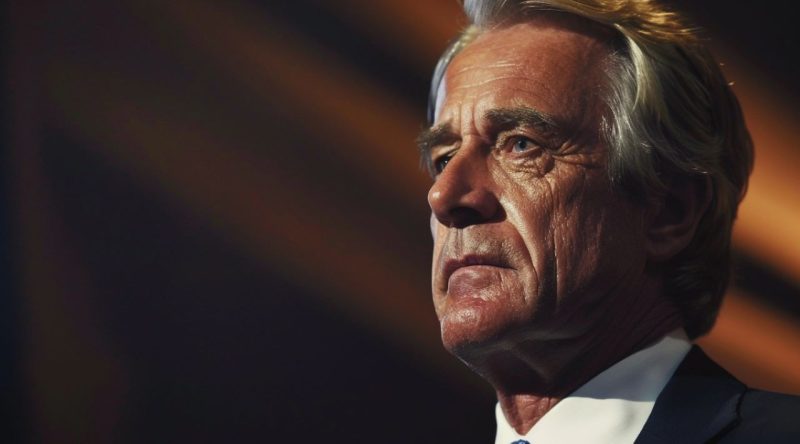
In a surprising twist that has left political analysts and everyday Americans alike scratching their heads, Robert F. Kennedy Jr. has endorsed Donald Trump, a move that directly conflicts with the liberal legacy of the Kennedy family.
The endorsement has triggered a firestorm of controversy, with many questioning Kennedy’s motivations and the implications for his family’s storied name. Known for their unwavering commitment to social justice, civil rights, and progressive causes, the Kennedys have long been considered one of America’s most revered political families. So what led Robert F. Kennedy Jr. to align himself with a figure like Donald Trump, a man who, for many, represents the antithesis of Kennedy ideals?
What Does Robert F. Kennedy Jr. See in Donald Trump?
Robert F. Kennedy Jr., an environmental lawyer and well-known anti-vaccine activist, has often found himself on the fringes of mainstream political discourse. His views have increasingly diverged from the Democratic Party’s platform, particularly around issues of public health and government control. It seems his endorsement of Trump is rooted in a shared distrust of the government and establishment figures, a sentiment Trump has capitalized on throughout his political career.
For Kennedy, Trump’s stance as a political outsider who challenges conventional wisdom and governmental authority resonates deeply. Despite Trump’s controversial and often divisive rhetoric, Kennedy appears to believe that aligning with him may amplify his own anti-establishment message. This is not about party loyalty but rather about a perceived alignment of values, particularly around skepticism of government intervention, which both men have vocally criticized.
Family Reactions: The Kennedy Clan Stands Firm
The Kennedy family’s reaction to Robert Jr.’s endorsement of Trump has been swift and unequivocal. Several members have publicly condemned his decision, reaffirming their commitment to the Democratic values that have defined the Kennedy legacy for decades. In a joint statement, family members expressed their dismay at what they see as a betrayal of the principles for which their relatives, including President John F. Kennedy and Senator Robert F. Kennedy, sacrificed their lives.
The family’s condemnation goes beyond political alignment; it touches on deeply held beliefs about public service, science, and the role of government in safeguarding the well-being of its citizens. Their rejection of Robert Jr.’s stance serves as a reminder that, for the Kennedys, public health and scientific integrity are non-negotiable. This schism not only underscores the ideological divide within the family but also reflects a broader split in American society over issues of truth, trust, and the role of government.
The Political and Social Impact of Anti-Vaccine Stance
Kennedy’s endorsement of Trump has also reignited debates around vaccine skepticism and the broader anti-vaccine movement. As a leading figure in this movement, Kennedy’s alignment with Trump could embolden vaccine skeptics and those who oppose public health mandates. This is particularly concerning in the context of the ongoing public health challenges, where misinformation and distrust of scientific expertise have been significant barriers to achieving herd immunity and controlling the spread of diseases.
Kennedy’s anti-vaccine stance has long been a point of contention, even within his family, who have publicly distanced themselves from his views. By aligning with Trump, Kennedy amplifies his message to a broader audience, potentially at the cost of undermining public trust in vaccines and other critical public health interventions. This raises the stakes not just for his family’s reputation but for public health in the United States.
What This Means for the Future of American Politics
The endorsement of Trump by a member of the Kennedy family is emblematic of the shifting political landscape in America. It highlights how traditional party loyalties are being upended by issues that cut across political lines, such as distrust of government, conspiracy theories, and the anti-vaccine movement. This alliance could signify a growing trend where individuals from historically opposing sides find common ground on specific, often fringe, issues, creating new and unpredictable political coalitions.
Kennedy’s move might be seen as a strategic attempt to position himself as a maverick, unbound by traditional party politics. However, it also risks alienating him from both his family and the Democratic base, potentially leaving him in a political no-man’s land. Whether this will prove to be a calculated risk that pays off or a misstep that isolates him further remains to be seen.
The Echoes of Conspiracy Theories and the Threat to Public Trust
The endorsement has broader implications for how conspiracy theories are normalized in American political discourse. Both Kennedy and Trump have trafficked in conspiracy theories, particularly around vaccines and government overreach. Their alignment could lend credence to these theories, further eroding trust in public institutions and experts.
This growing embrace of conspiratorial thinking is not just a political curiosity; it represents a real threat to democracy and public health. When public figures with significant platforms endorse and propagate unfounded theories, they contribute to a culture of mistrust that can have serious consequences, including reduced vaccine uptake, increased social division, and even violence.
Conclusion: A Turning Point or a Footnote in Political History?
Robert F. Kennedy Jr.’s endorsement of Donald Trump is a moment that could either signal a significant realignment in American politics or fade into the annals of political oddities. It highlights the deepening divides in American society and the complex interplay of personal belief, political strategy, and public influence. While it remains to be seen how this will impact Kennedy’s standing and influence, one thing is clear: the Kennedy name, once synonymous with progressive ideals and public service, is now at the center of a debate about the very future of those ideals.
As we navigate this increasingly polarized political landscape, the actions of figures like Robert F. Kennedy Jr. remind us that the battle for truth and trust is more crucial than ever. Whether this is a turning point in American politics or merely a fleeting controversy, it serves as a stark reminder of the challenges we face in maintaining a healthy democracy grounded in facts, science, and a shared commitment to the public good.
